冀教版英语七年级下Unit 6 Seasons Lesson 31 What Strange Weather!课件+嵌入音频(31张PPT)
文档属性
| 名称 | 冀教版英语七年级下Unit 6 Seasons Lesson 31 What Strange Weather!课件+嵌入音频(31张PPT) | 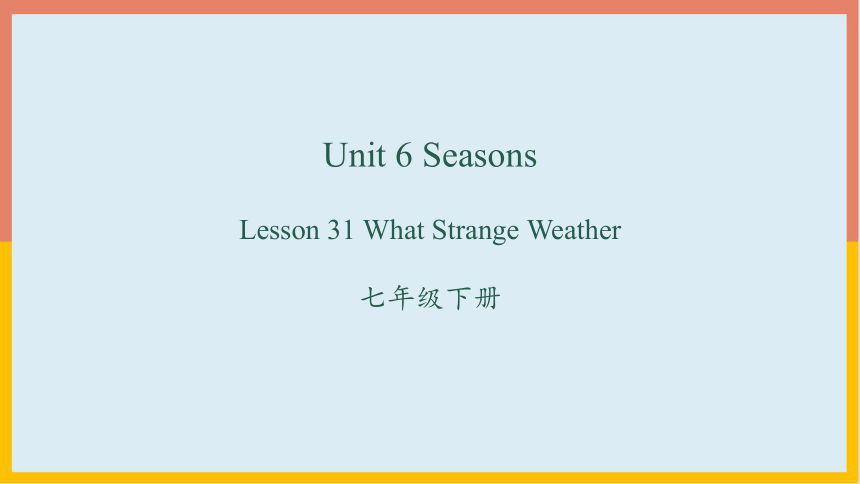 | |
| 格式 | zip | ||
| 文件大小 | 6.2MB | ||
| 资源类型 | 教案 | ||
| 版本资源 | 冀教版 | ||
| 科目 | 英语 | ||
| 更新时间 | 2021-12-31 13:43:46 | ||
图片预览

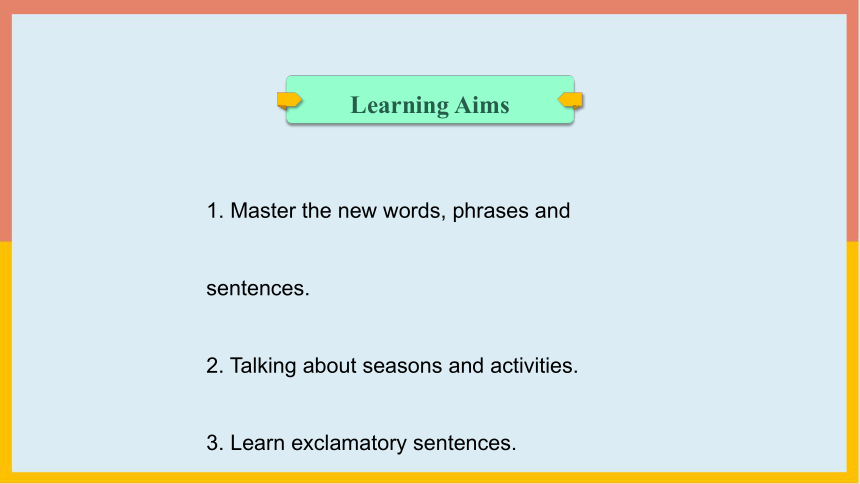
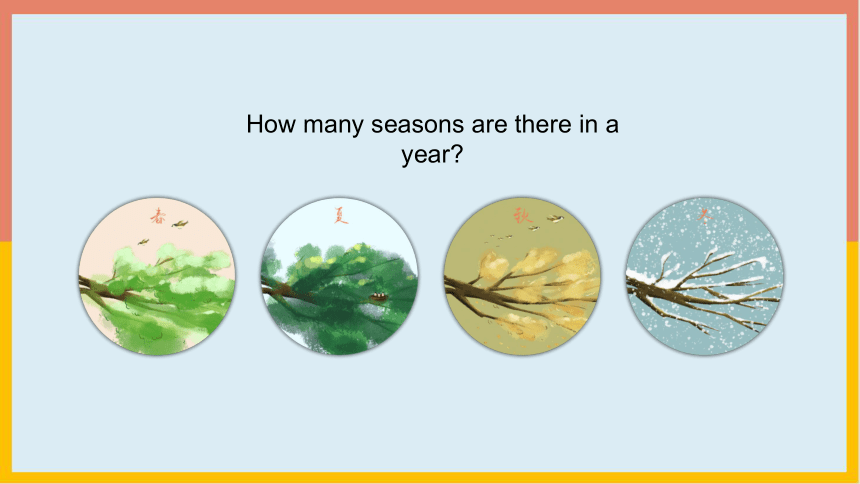
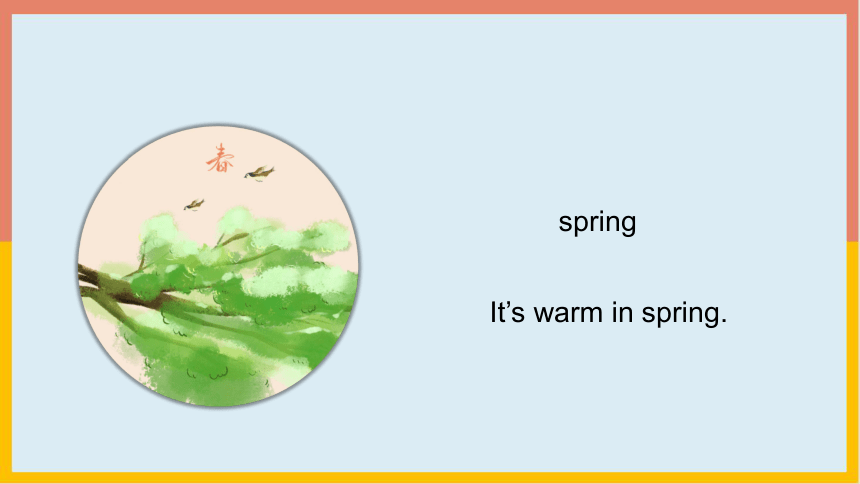
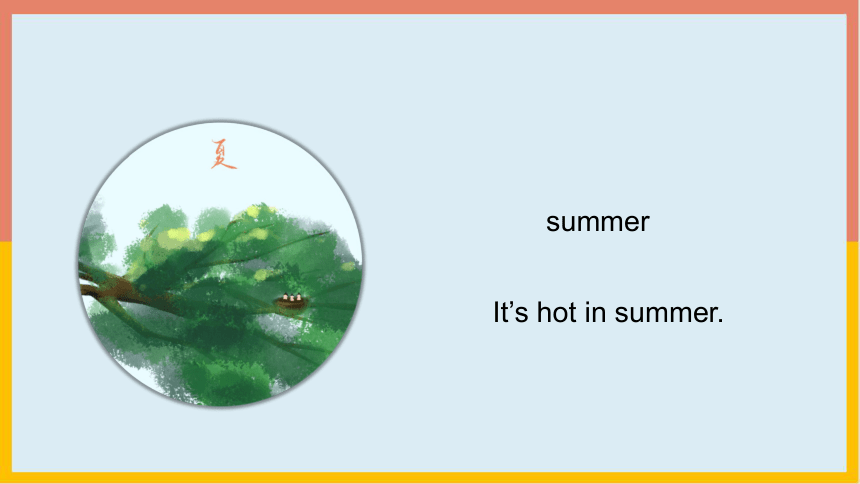
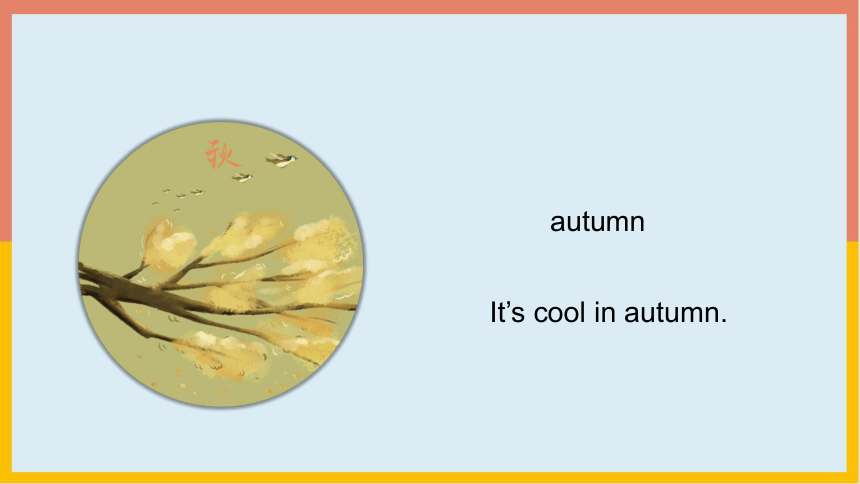
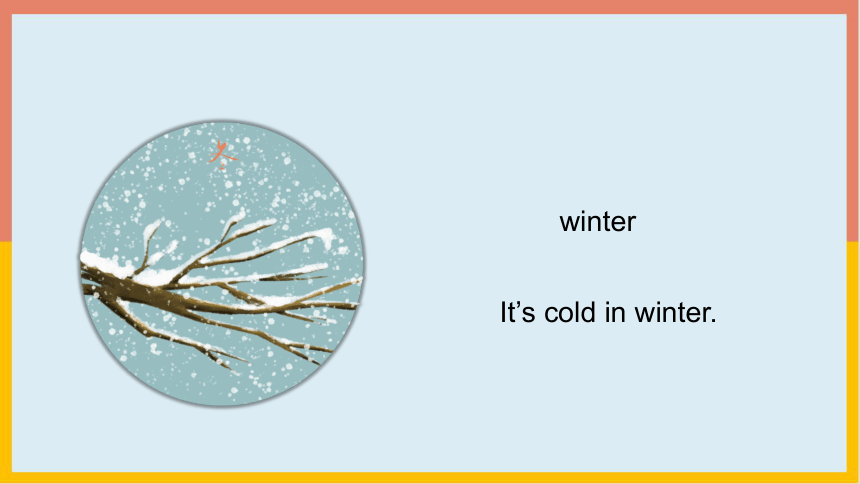

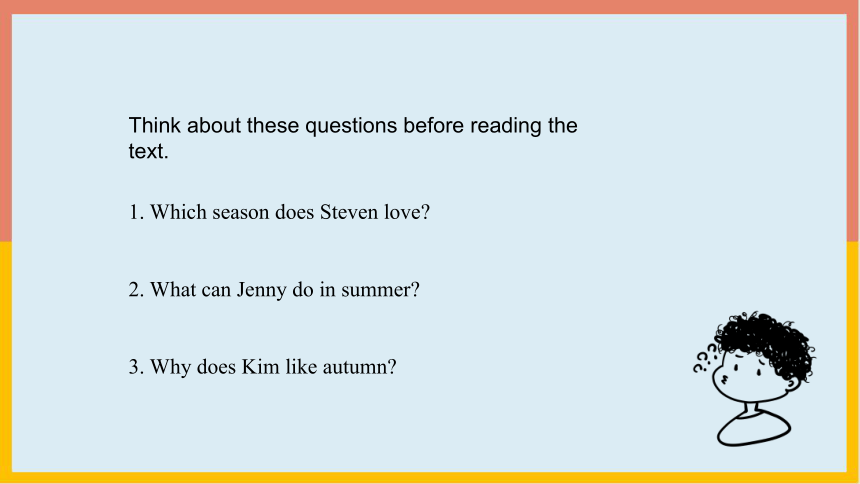
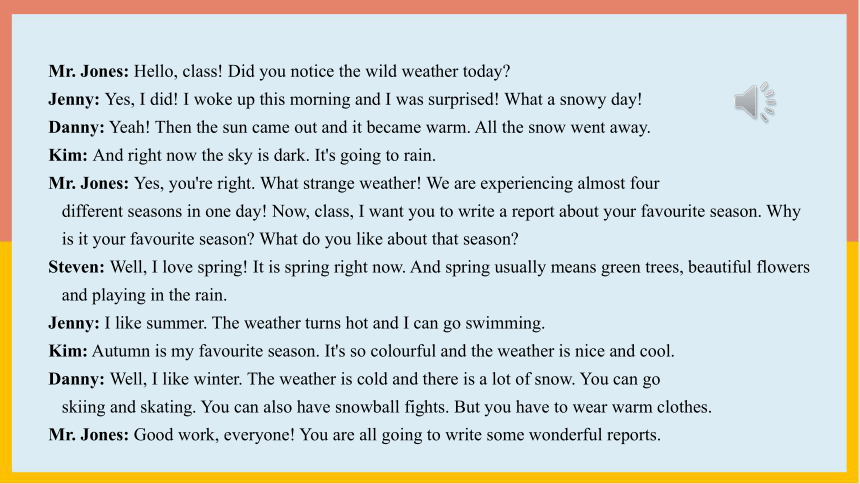
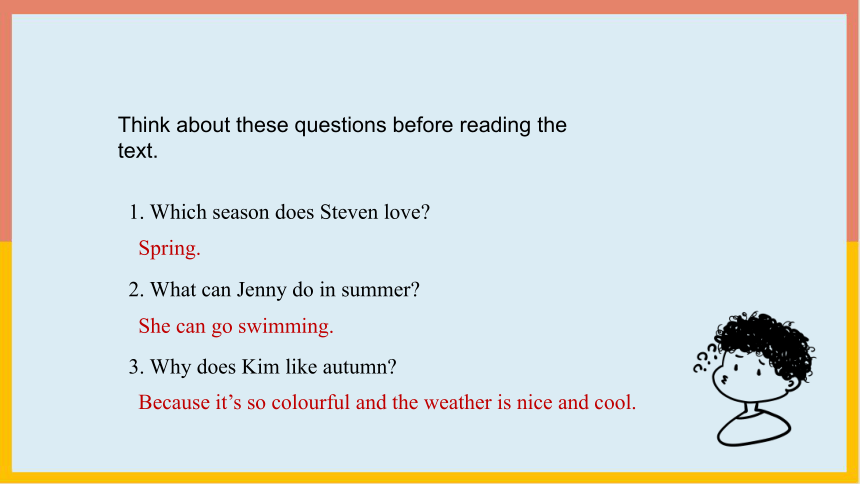

文档简介
(共31张PPT)
Unit 6 Seasons
Lesson 31 What Strange Weather
七年级下册
Learning Aims
1. Master the new words, phrases and sentences.
2. Talking about seasons and activities.
3. Learn exclamatory sentences.
How many seasons are there in a year
spring
It’s warm in spring.
summer
It’s hot in summer.
autumn
It’s cool in autumn.
winter
It’s cold in winter.
There are four seasons in a year. Which season do you like best Did you experience four seasons in a day Mr. Johns and his students have a special. Why is it special Let’s listen, read and learn more.
“
“
Think about these questions before reading the text.
1. Which season does Steven love
2. What can Jenny do in summer
3. Why does Kim like autumn
Mr. Jones: Hello, class! Did you notice the wild weather today
Jenny: Yes, I did! I woke up this morning and I was surprised! What a snowy day!
Danny: Yeah! Then the sun came out and it became warm. All the snow went away.
Kim: And right now the sky is dark. It's going to rain.
Mr. Jones: Yes, you're right. What strange weather! We are experiencing almost four
different seasons in one day! Now, class, I want you to write a report about your favourite season. Why
is it your favourite season What do you like about that season
Steven: Well, I love spring! It is spring right now. And spring usually means green trees, beautiful flowers
and playing in the rain.
Jenny: I like summer. The weather turns hot and I can go swimming.
Kim: Autumn is my favourite season. It's so colourful and the weather is nice and cool.
Danny: Well, I like winter. The weather is cold and there is a lot of snow. You can go
skiing and skating. You can also have snowball fights. But you have to wear warm clothes.
Mr. Jones: Good work, everyone! You are all going to write some wonderful reports.
1. Which season does Steven love
2. What can Jenny do in summer
3. Why does Kim like autumn
Think about these questions before reading the text.
She can go swimming.
Spring.
Because it’s so colourful and the weather is nice and cool.
What strange weather!
多么奇怪的天气!
这是一个由What引导的感叹句。
what引导的感叹句的构成:
What +a/an+形容词+单数可数名词!
What +形容词+不可数名词/复数可数名词!
e.g.
What a tall tree (it is)!
What tall trees (they are)!
How也可以引导感叹句,how引导的感叹句的构成:
How+形容词/副词+主语+谓语!
e.g.
How big the room is! (how+形容词)
How fast the boy runs!(how+副词)
Did you notice the wild weather today
你们注意到今天这恶劣的天气了吗
notice v. 注意到;看到 n. 布告;启事
notice作动词:
notice sb. do sth. “注意到某人做了某事”(表示注意到动作经常发生或注意到全过程);
notice sb. doing sth. “注意到某人正在做某”(强调动作正在发生)。
Notice作名词,意为“通知,布告;启事”
I woke up this morning and I was surprised.
今天早上我醒来,感到很惊讶。
wake up 及物动词短语,意为“叫醒”;up是副词,代词作宾语时,放在短语的中间;名词作宾语时,放在短语的后面、中间均可;
wake up 不及物动词短语,意为“醒来”(指主语自己醒来)不能接宾语。
up相关的短语
up
give up 放弃
come up 出现;发生
pick up 捡起
look up 查阅
turn up 调大;露面
grow up 长大;成长
getup 起床
use up 用光
stay up 熬夜
call/ring up 打电话
set up 建立
put up 举起;张贴;建造
I woke up this morning and I was surprised.
今天早上我醒来,感到很惊讶。
surprised作形容词,意为“感到惊讶的”,其主语通常为人。常用搭配如下:
be surprised to do sth. 表示“对做某事感到惊讶”;
be surprised at sth. 表示“对某物/事感到惊讶”。
surprise的用法
作名词,意为“意想不到的事;令人惊奇的事”,
常用于短语:
to one’s surprise 表示“令某人吃惊的是……”;
in surprise 表示“惊奇地,诧异地”;
作动词,意为“使惊讶”,
常用短语:
surprise sb. 意为“使某人感到惊讶”。
The weather turns hot and I can go swimming.
天气变热了,我可以去游泳。
这里turn作系动词,后面跟形容词作表语。
e.g.
In spring, trees turn green.
The weather turns hot and I can go swimming.
天气变热了,我可以去游泳。
go swimming去游泳
类似短语还有:
go shopping 去购物
go boating 去划船
go fishing 去钓鱼
1 What are the students’ favourite seasons Listen and fill in the table.
Name
Favourite Season
Steven
Jenny
Kim
Danny
spring
summer
autumn
winter
2 What was the weather like that day
Read the lesson and put the weather descriptions in the correct order.
1. Right now the sky is dark.
2. All the snow went away.
3.The sun came out and it became warm.
4.What a snowy day!
5.It’s going to rain.
The correct order is:__________________________________________
4 3 2 1 5
3 Match the pictures with the exclamatory sentences.
What a snowy day!
What beautiful flowers they are!
What a hot, sunny day!
What cool weather it is!
4 Fill in the blanks with the words or phrase in the box.
notice dark strange wild wake up
1. The man always sleeps in the day and works at night. That is very .
2. It’s getting . I must go home.
3. What time do you usually every morning
4. Our teacher changed her hair style. Do you that
5. Sometimes the sea is quiet and sometimes it’s very .
strange
dark
wake up
notice
wild
Words:
strange, notice, wake, come, dark
Phrases:
wake up, go away, have snowball fights,
go swimming/skating/skiing
Sentences:
What strange weather!
I woke up this morning and I was surprised.
Did you notice the wild weather today
根据句意及汉语提示完成单词
1. My little sister is afraid of the (黑暗).
2. I don’t (注意) someone enter the room.
3. Jake is a (奇怪的) man. He never talks with his neighbours.
4. Could you (叫醒) me up at five tomorrow
5. Eric wants to (成为) an actor.
dark
notice
strange
wake
become
用所给单词的适当形式填空
1. We have snowball ________ (fight) in winter.
2. The boy and his father go ____________ (swim) every weekend.
3. We are ____________ (experience) a hard time before the exam.
4. The life in the college is __________ (colour).
5. What a ________ (snow) day! We can go ________ (ski) together.
fights
swimming
experiencing
colourful
snowy skiing
根据提示完成句子, 并背记英语句子
1. 你可以滑雪和滑冰。
You can _______ __________ and _________.
2. 然后太阳出来了, 变得暖和了。
Then the sun ________ ________ and it ________ warm.
3. 所有的雪都消失了。
All the snow ________ ________.
go skiing skating
came out became
went away
根据提示完成句子, 并背记英语句子
4. 今天早晨醒来, 我非常惊讶!
I ________ ________ this morning and I was ____________!
5. 你也可以打雪仗。
You can also _______ ____________ ________.
woke up surprised
have snowball fights
1. Review and recite the important points of Lesson 31.
2. Talk about seasons with your partner. Then write a short passage about it.
空白演示
单击输入您的封面副标题
谢 谢 聆 听
Unit 6 Seasons
Lesson 31 What Strange Weather
七年级下册
Learning Aims
1. Master the new words, phrases and sentences.
2. Talking about seasons and activities.
3. Learn exclamatory sentences.
How many seasons are there in a year
spring
It’s warm in spring.
summer
It’s hot in summer.
autumn
It’s cool in autumn.
winter
It’s cold in winter.
There are four seasons in a year. Which season do you like best Did you experience four seasons in a day Mr. Johns and his students have a special. Why is it special Let’s listen, read and learn more.
“
“
Think about these questions before reading the text.
1. Which season does Steven love
2. What can Jenny do in summer
3. Why does Kim like autumn
Mr. Jones: Hello, class! Did you notice the wild weather today
Jenny: Yes, I did! I woke up this morning and I was surprised! What a snowy day!
Danny: Yeah! Then the sun came out and it became warm. All the snow went away.
Kim: And right now the sky is dark. It's going to rain.
Mr. Jones: Yes, you're right. What strange weather! We are experiencing almost four
different seasons in one day! Now, class, I want you to write a report about your favourite season. Why
is it your favourite season What do you like about that season
Steven: Well, I love spring! It is spring right now. And spring usually means green trees, beautiful flowers
and playing in the rain.
Jenny: I like summer. The weather turns hot and I can go swimming.
Kim: Autumn is my favourite season. It's so colourful and the weather is nice and cool.
Danny: Well, I like winter. The weather is cold and there is a lot of snow. You can go
skiing and skating. You can also have snowball fights. But you have to wear warm clothes.
Mr. Jones: Good work, everyone! You are all going to write some wonderful reports.
1. Which season does Steven love
2. What can Jenny do in summer
3. Why does Kim like autumn
Think about these questions before reading the text.
She can go swimming.
Spring.
Because it’s so colourful and the weather is nice and cool.
What strange weather!
多么奇怪的天气!
这是一个由What引导的感叹句。
what引导的感叹句的构成:
What +a/an+形容词+单数可数名词!
What +形容词+不可数名词/复数可数名词!
e.g.
What a tall tree (it is)!
What tall trees (they are)!
How也可以引导感叹句,how引导的感叹句的构成:
How+形容词/副词+主语+谓语!
e.g.
How big the room is! (how+形容词)
How fast the boy runs!(how+副词)
Did you notice the wild weather today
你们注意到今天这恶劣的天气了吗
notice v. 注意到;看到 n. 布告;启事
notice作动词:
notice sb. do sth. “注意到某人做了某事”(表示注意到动作经常发生或注意到全过程);
notice sb. doing sth. “注意到某人正在做某”(强调动作正在发生)。
Notice作名词,意为“通知,布告;启事”
I woke up this morning and I was surprised.
今天早上我醒来,感到很惊讶。
wake up 及物动词短语,意为“叫醒”;up是副词,代词作宾语时,放在短语的中间;名词作宾语时,放在短语的后面、中间均可;
wake up 不及物动词短语,意为“醒来”(指主语自己醒来)不能接宾语。
up相关的短语
up
give up 放弃
come up 出现;发生
pick up 捡起
look up 查阅
turn up 调大;露面
grow up 长大;成长
getup 起床
use up 用光
stay up 熬夜
call/ring up 打电话
set up 建立
put up 举起;张贴;建造
I woke up this morning and I was surprised.
今天早上我醒来,感到很惊讶。
surprised作形容词,意为“感到惊讶的”,其主语通常为人。常用搭配如下:
be surprised to do sth. 表示“对做某事感到惊讶”;
be surprised at sth. 表示“对某物/事感到惊讶”。
surprise的用法
作名词,意为“意想不到的事;令人惊奇的事”,
常用于短语:
to one’s surprise 表示“令某人吃惊的是……”;
in surprise 表示“惊奇地,诧异地”;
作动词,意为“使惊讶”,
常用短语:
surprise sb. 意为“使某人感到惊讶”。
The weather turns hot and I can go swimming.
天气变热了,我可以去游泳。
这里turn作系动词,后面跟形容词作表语。
e.g.
In spring, trees turn green.
The weather turns hot and I can go swimming.
天气变热了,我可以去游泳。
go swimming去游泳
类似短语还有:
go shopping 去购物
go boating 去划船
go fishing 去钓鱼
1 What are the students’ favourite seasons Listen and fill in the table.
Name
Favourite Season
Steven
Jenny
Kim
Danny
spring
summer
autumn
winter
2 What was the weather like that day
Read the lesson and put the weather descriptions in the correct order.
1. Right now the sky is dark.
2. All the snow went away.
3.The sun came out and it became warm.
4.What a snowy day!
5.It’s going to rain.
The correct order is:__________________________________________
4 3 2 1 5
3 Match the pictures with the exclamatory sentences.
What a snowy day!
What beautiful flowers they are!
What a hot, sunny day!
What cool weather it is!
4 Fill in the blanks with the words or phrase in the box.
notice dark strange wild wake up
1. The man always sleeps in the day and works at night. That is very .
2. It’s getting . I must go home.
3. What time do you usually every morning
4. Our teacher changed her hair style. Do you that
5. Sometimes the sea is quiet and sometimes it’s very .
strange
dark
wake up
notice
wild
Words:
strange, notice, wake, come, dark
Phrases:
wake up, go away, have snowball fights,
go swimming/skating/skiing
Sentences:
What strange weather!
I woke up this morning and I was surprised.
Did you notice the wild weather today
根据句意及汉语提示完成单词
1. My little sister is afraid of the (黑暗).
2. I don’t (注意) someone enter the room.
3. Jake is a (奇怪的) man. He never talks with his neighbours.
4. Could you (叫醒) me up at five tomorrow
5. Eric wants to (成为) an actor.
dark
notice
strange
wake
become
用所给单词的适当形式填空
1. We have snowball ________ (fight) in winter.
2. The boy and his father go ____________ (swim) every weekend.
3. We are ____________ (experience) a hard time before the exam.
4. The life in the college is __________ (colour).
5. What a ________ (snow) day! We can go ________ (ski) together.
fights
swimming
experiencing
colourful
snowy skiing
根据提示完成句子, 并背记英语句子
1. 你可以滑雪和滑冰。
You can _______ __________ and _________.
2. 然后太阳出来了, 变得暖和了。
Then the sun ________ ________ and it ________ warm.
3. 所有的雪都消失了。
All the snow ________ ________.
go skiing skating
came out became
went away
根据提示完成句子, 并背记英语句子
4. 今天早晨醒来, 我非常惊讶!
I ________ ________ this morning and I was ____________!
5. 你也可以打雪仗。
You can also _______ ____________ ________.
woke up surprised
have snowball fights
1. Review and recite the important points of Lesson 31.
2. Talk about seasons with your partner. Then write a short passage about it.
空白演示
单击输入您的封面副标题
谢 谢 聆 听
同课章节目录
- Unit 1 A Trip to the Silk Road
- Lesson 1 A Trip to China
- Lesson 2 Meet You in Beijing
- Lesson 3 A Visit to Xi'an
- Lesson 4 A Visit to Lanzhou
- Lesson 5 Another Stop along the Silk Road
- Lesson 6 Jenny's Diary
- Unit 2 It's Show Time!
- Lesson 7 What's Your Project about?
- Lesson 8 Marco Polo and the Silk Road
- Lesson 9 Danny's School Project
- Lesson 10 Music and Dance
- Lesson 11 Food in China
- Lesson 12 A Blog about the Silk Road
- Unit 3 School Life
- Lesson 13 How Is School Going?
- Lesson 14 Jenny's School Life
- Lesson 15 Making a Difference
- Lesson 16 We Are with You!
- Lesson 17 School Science Fai
- Lesson 18 Teaching in China
- Unit 4 After-School Activities
- Lesson 19 A Dinner Date
- Lesson 20 Join Our Club!
- Lesson 21 What Is Your Club Type?
- Lesson 22 Big Plans for the Weekend
- Lesson 23 A Weekend with Grandma
- Lesson 24 How was Your Weekend?
- Unit 5 I Love Learning English!
- Lesson 25 A Phone Friend
- Lesson 26 Online Phone Calls
- Lesson 27 Amazing English
- Lesson 28 How Do I Learn English?
- Lesson 29 A Door to the World
- Lesson 30 Writing an E-mail in English
- Unit 6 Seasons
- Lesson 31 What Strange Weather!
- Lesson 32 I Can't Wait for Winter!
- Lesson 33 Kim's Favourite Season
- Lesson 34 Steven's Report
- Lesson 35 Surfing in Sydney
- Lesson 36 Spring in China
- Unit 7 Sports and Good Health
- Lesson 37 You Are What You Eat!
- Lesson 38 Stay Healthy!
- Lesson 39 Danny's Report
- Lesson 40 Move Your Body
- Lesson 41 Were People Healthy Then?
- Lesson 42 Know Yourself
- Unit 8 Summer Holiday Is Coming!
- Lesson 43 Have a Good Summer!
- Lesson 44 Volunteering in Summe
- Lesson 45 Baseball Season
- Lesson 46 Get Ready for Summer Holiday!
- Lesson 47 Summer Plans
- Lesson 48 Li Ming's Summer Holiday
